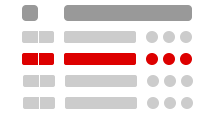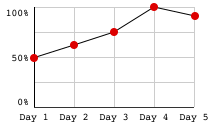Perpendicular linestwo lines form right angles to each other when they intersect. If the slope of first line is , the slope of perpendicular line is the slope of perpendicular line is . The product of the two slopes is -1.
Parallel and Perpendicular Lines in Linear Functions Unlock the power of parallel and perpendicular lines in linear functions. Master key concepts, tackle real-world applications, and boost your problem-solving skills in algebra and geometry.
- Determine whether the three points A (-2,-1), B(0,4) & C(2,9) all lie on the same line.
- Determine the following slopes are parallel, perpendicular, or neither.
i) m1=52,m2=52
ii) m1=51,m2=−15
iii) m1=74,m2=2112
iv) m1=undefined, m2=0
v) m1=mn−1;m2=−m−1b - Given the points of two lines, determine when the lines are parallel, perpendicular or neither.
- Show that the points A(-3,0), B(1,2) and C(3,-2) are the vertices of a right triangle.
- Show that the points A(-1,-1), B(3,0), C(2,4) and D(-2,3) are the vertices of a square.
Free to Join!
Easily See Your Progress
 We track the progress you've made on a topic so you know what you've done. From the course view you can easily see what topics have what and the progress you've made on them. Fill the rings to completely master that section or mouse over the icon to see more details.
We track the progress you've made on a topic so you know what you've done. From the course view you can easily see what topics have what and the progress you've made on them. Fill the rings to completely master that section or mouse over the icon to see more details.Make Use of Our Learning Aids
Earn Achievements as You Learn
 Make the most of your time as you use StudyPug to help you achieve your goals. Earn fun little badges the more you watch, practice, and use our service.
Make the most of your time as you use StudyPug to help you achieve your goals. Earn fun little badges the more you watch, practice, and use our service.Create and Customize Your Avatar
 Play with our fun little avatar builder to create and customize your own avatar on StudyPug. Choose your face, eye colour, hair colour and style, and background. Unlock more options the more you use StudyPug.
Play with our fun little avatar builder to create and customize your own avatar on StudyPug. Choose your face, eye colour, hair colour and style, and background. Unlock more options the more you use StudyPug.
Perpendicular linestwo lines form right angles to each other when they intersect. If the slope of first line is , the slope of perpendicular line is the slope of perpendicular line is . The product of the two slopes is -1.
Introduction to Parallel and Perpendicular Lines in Linear Functions
Welcome to our exploration of parallel and perpendicular lines in linear functions. This fundamental concept in geometry and algebra plays a crucial role in understanding the relationships between lines in a coordinate plane. Our introduction video provides a visual foundation for grasping these concepts, setting the stage for a deeper dive into the topic. Throughout this lesson, we'll uncover the methods to determine whether lines are parallel, perpendicular, or neither. We'll examine how to use points, slopes, and equations to make these distinctions. Parallel lines never intersect and have the same slope, while perpendicular lines intersect at right angles and have slopes that are negative reciprocals of each other. By mastering these concepts, you'll enhance your ability to analyze and interpret linear relationships in various mathematical and real-world scenarios. Let's embark on this journey to unravel the intricacies of parallel and perpendicular lines in linear functions.
Given the points of two lines, determine when the lines are parallel, perpendicular or neither.
Line 1: (3,2) & (1,4); Line 2: (-1,-2) & (-3,-4)
Step 1: Understand the Problem
We are given two lines, each defined by two points. Our task is to determine whether these lines are parallel, perpendicular, or neither. To do this, we need to calculate the slopes of both lines and compare them.
Step 2: Calculate the Slope of Line 1
The slope of a line passing through two points (x1,y1) and (x2,y2) is given by the formula:
m=x2−x1y2−y1
For Line 1, the points are (3,2) and (1,4). Plugging these values into the formula, we get:
m1=1−34−2=−22=−1
So, the slope of Line 1 is -1.
Step 3: Calculate the Slope of Line 2
For Line 2, the points are (-1,-2) and (-3,-4). Using the same slope formula, we get:
m2=−3−(−1)−4−(−2)=−3+1−4+2=−2−2=1
So, the slope of Line 2 is 1.
Step 4: Compare the Slopes
Now that we have the slopes of both lines, we can compare them to determine the relationship between the lines:
- If the slopes are equal, the lines are parallel.
- If the product of the slopes is -1, the lines are perpendicular.
- If neither condition is met, the lines are neither parallel nor perpendicular.
m1×m2=−1×1=−1 Since the product is -1, the lines are perpendicular.
Step 5: Conclusion
Based on our calculations, we can conclude that Line 1 and Line 2 are perpendicular to each other.
1. What is the difference between perpendicular and parallel lines?
Parallel lines are two lines in a plane that never intersect, no matter how far they are extended. They always maintain the same distance between them and have the same slope. Perpendicular lines, on the other hand, intersect at a right angle (90 degrees). Their slopes are negative reciprocals of each other, meaning if you multiply their slopes, the result is -1.
2. How do you know if lines are parallel or perpendicular?
To determine if lines are parallel or perpendicular, compare their slopes: - Parallel lines have equal slopes (m1 = m2) - Perpendicular lines have slopes that are negative reciprocals (m1 * m2 = -1) If you have equations, convert them to slope-intercept form (y = mx + b) to easily compare slopes.
3. What are the rules for parallel and perpendicular lines?
For parallel lines: - They have the same slope - They never intersect - The distance between them remains constant For perpendicular lines: - They intersect at a 90-degree angle - Their slopes are negative reciprocals (m1 * m2 = -1) - If one line has a slope m, the perpendicular line's slope is -1/m
4. How to remember parallel and perpendicular?
To remember parallel lines, think of train tracks that never meet. For perpendicular lines, visualize the corner of a square or the letter "L". Remember that parallel lines have the same slope, while perpendicular lines have slopes that are negative reciprocals. The product of perpendicular slopes is always -1.
5. What is the formula for parallel and perpendicular lines?
For a line y = mx + b: - A parallel line has the equation y = mx + c (same slope, different y-intercept) - A perpendicular line has the equation y = (-1/m)x + d (negative reciprocal slope) Where c and d are constants representing different y-intercepts.
To fully grasp the concept of parallel and perpendicular lines in linear functions, it's crucial to have a solid foundation in several key areas of algebra. Understanding these prerequisite topics will significantly enhance your ability to analyze and work with parallel and perpendicular lines effectively.
One of the most fundamental concepts you need to master is the slope formula. This equation, m = (y-y)/(x-x), is essential for determining the steepness and direction of a line. When dealing with parallel and perpendicular lines, the slope plays a pivotal role in identifying their relationships.
Equally important is understanding the coordinate plane, which provides the framework for visualizing and plotting linear functions. Familiarity with the x and y axes, as well as how to plot points, is crucial when working with parallel and perpendicular lines.
Building on these basics, you should be comfortable with linear equation applications, particularly graphing from the slope-intercept form y=mx+b. This form is frequently used when dealing with parallel and perpendicular lines, as it clearly shows the slope (m) and y-intercept (b).
Additionally, knowing how to graph linear functions using a single point and slope is invaluable. This skill allows you to quickly sketch lines and understand their relationships in the context of parallel and perpendicular lines.
Two special cases that are particularly relevant are vertical lines of linear equations and horizontal lines of linear equations. Vertical lines have an undefined slope, while horizontal lines have a slope of zero. Understanding these special cases is crucial when analyzing parallel and perpendicular relationships, as they represent extreme examples that often require unique consideration.
By mastering these prerequisite topics, you'll be well-equipped to tackle the complexities of parallel and perpendicular lines in linear functions. You'll be able to recognize parallel lines by their equal slopes and perpendicular lines by their negative reciprocal slopes. Moreover, you'll have the skills to graph these relationships accurately and solve problems involving parallel and perpendicular lines with confidence.
Remember, each of these prerequisite topics builds upon the others, creating a comprehensive understanding of linear functions that is essential for exploring more advanced concepts in algebra and geometry. Take the time to review and practice these fundamental skills, and you'll find that working with parallel and perpendicular lines becomes much more intuitive and manageable.



